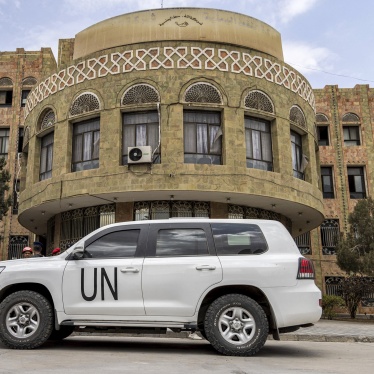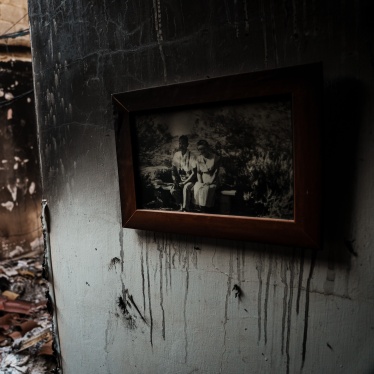The executive directors of leading human rights organizations have written to President about the ill-treatment of prisoners in U.S. custody in Iraq, Afghanistan, and Guantanamo Bay. Incidents of abuse have been reported in these locations over many months and the human rights organizations have made a set of specific recommendations for the U.S. to end the abuse and hold the perpetrators responsible.
For the past year and a half, The Wall Street Journal, Washington Post, USA Today, Newsday, New York Times, Los Angeles Times, Christian Science Monitor, and other leading newspapers have repeatedly quoted unnamed U.S. intelligence officials boasting about the use of torture and other ill-treatment of prisoners. Numerous detainees have been killed or attempted suicide in custody in Afghanistan, Iraq and Guantanamo Bay prompting unprecedented expressions of concern by the International Committee of the Red Cross; suspects have been turned over to the foreign intelligence services of countries, such as Syria, with records of brutal torture; the ICRC has also specifically expressed concern about conditions at Abu Ghraib prison in Iraq; and now, the US military’s own inquiry has found “systemic and illegal abuse of detainees” at Abu Ghraib.
These incidents occurred across continents and over many months, but they are nevertheless linked. As Cofer Black, the head of the CIA’s Counterterrorism Center, told Congress in September 2002: “There was a before 9/11, and there was an after 9/11 …. After 9/11 the gloves come off.” Since then, intelligence officials have said repeatedly that they have a mandate to obtain information by "breaking" prisoners through a combination of pain and humiliation, if not outright torture. The sexual humiliation of prisoners now documented at Abu Ghraib was extreme, but not new. More than a year ago, The New York Times quoted prisoners held in Afghanistan saying that they were kept naked most of the time. Likewise, there have been numerous reports of female guards and interrogators used in a deliberate attempt to humiliate and degrade prisoners.
For over a year, the undersigned organizations and others have repeatedly asked you and senior officials in your Administration to act promptly and forcefully to publicly repudiate the statements of intelligence officials and to assure that the treatment of detainees is consistent with international humanitarian law. We particularly asked that you provide access to detention centers, release the results of investigations and take other steps to ensure greater transparency of the detention process.
Last June, human rights groups welcomed your pledge that the United States would lead by example in the fight against torture. Yet whatever steps your administration may have taken to implement that pledge have been inadequate to end torture and inhuman treatment of prisoners and to dispel the apparent belief among U.S. interrogators and guards that brutality and degradation are acceptable in the quest for information. The events at Abu Ghraib now in the headlines are the latest evidence of an interrogation and detention system that appears to be out of control and of inadequate action to match your pledges, not the isolated misdeeds of a few individuals allegedly acting without authorization.
This pattern of conduct has caused extraordinary damage to the cause of human rights around the world, as well as to the United States and to its ability to conduct foreign policy successfully, from Iraq to the global campaign against terrorism.
Extraordinary action on your part is now required to begin to repair this damage and, at long last, bring an end to this pattern of torture and cruel treatment. You have stated in eloquent terms that “human dignity is non-negotiable,” but you have tolerated a U.S. system of interrogation that is specifically designed to degrade, humiliate and destroy the human dignity of prisoners to obtain information. In recent days, U.S. officials in Iraq have announced a welcome prohibition on the use of a number of “stress” interrogation tactics. You should follow through on these announcements by completely banning the use of the “stress and duress” tactics and incommunicado detention throughout the world.
The choice is not about whether to express your abhorrence over the events at Abu Ghraib and to investigate them. The choice is whether you dismiss them as the actions of “a few bad apples” while continuing an interrogation and detention system that is cruel and illegal, or act forcefully to end the “stress and duress” system of incommunicado interrogation in Iraq, Afghanistan, Guantanamo Bay, or anywhere that people are held in U.S. custody. This system violates both the Constitution and international law, including the solemn pledges your father made when he sought Senate approval of the Convention Against Torture.
We ask you to take immediate actions to establish clear prohibitions on illegal and inappropriate interrogation and detention methods backed by strong penalties; mandate strong enforcement mechanisms, including access for independent monitors; and provide for public review and full disclosure of interrogation practices and the records of investigations. Our specific recommendations for accomplishing these goals are attached.
We appreciate your interest in our concerns and your consideration of our recommendations. We hope that we will be able to arrange a meeting with you as soon as possible.
Sincerely,
William Schulz
Amnesty International USA
Gay McDougall
Global Rights
Michael Posner
Human Rights First
Ken Roth
Human Rights Watch
Louise Kantrow
International League for Human Rights
Felice D. Gaer
Jacob Blaustein Institute for the Advancement of Human Rights
Robin Phillips
Minnesota Advocates for Human Rights
Len Rubenstein
Physicians for Human Rights USA
Todd Howland
RFK Memorial Center for Human Rights
Establish Clear Prohibitions Backed by Adequate Penalties
Mandate Strong Enforcement
Provide Public Review and Full Disclosure







